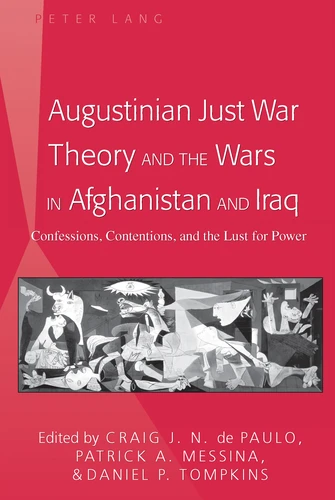Augustinian Just War Theory and the Wars in Afghanistan and Iraq. Confessions, Contentions, and the Lust for Power
Par : , ,Formats :
- Paiement en ligne :
- Livraison à domicile ou en point Mondial Relay indisponible
- Retrait Click and Collect en magasin gratuit
- Nombre de pages157
- ISBN978-1-4331-1232-4
- EAN9781433112324
- Date de parution01/06/2011
- ÉditeurPeter Lang
Résumé
Augustinian Just War Theory and the Wars in Afghanistan and Iraq : Confessions, Contentions, and the Lust for Power details two major symposia on the topic of Christian (Augustinian) just war theory, its strengths and weaknesses, and its controversial application to the wars in Afghanistan and Iraq. The renowned participants represent some of the most distinguished philosophers, theologians, and foreign policy makers in the world, including John D.
Caputo, Cardinal Avery Dulles, S.J., Joseph Margolis, Cardinal Seán O'Malley (Preface), Roland J. Teske, S.J. (Foreword), and Frederick Van Fleteren. By intersecting philosophy, theology, and foreign policy, this book greatly contributes to the global discussion of the current wars in Afghanistan and Iraq, and it provides the foundation for analyzing the present war in Libya as well as future conflicts.
Caputo, Cardinal Avery Dulles, S.J., Joseph Margolis, Cardinal Seán O'Malley (Preface), Roland J. Teske, S.J. (Foreword), and Frederick Van Fleteren. By intersecting philosophy, theology, and foreign policy, this book greatly contributes to the global discussion of the current wars in Afghanistan and Iraq, and it provides the foundation for analyzing the present war in Libya as well as future conflicts.
Augustinian Just War Theory and the Wars in Afghanistan and Iraq : Confessions, Contentions, and the Lust for Power details two major symposia on the topic of Christian (Augustinian) just war theory, its strengths and weaknesses, and its controversial application to the wars in Afghanistan and Iraq. The renowned participants represent some of the most distinguished philosophers, theologians, and foreign policy makers in the world, including John D.
Caputo, Cardinal Avery Dulles, S.J., Joseph Margolis, Cardinal Seán O'Malley (Preface), Roland J. Teske, S.J. (Foreword), and Frederick Van Fleteren. By intersecting philosophy, theology, and foreign policy, this book greatly contributes to the global discussion of the current wars in Afghanistan and Iraq, and it provides the foundation for analyzing the present war in Libya as well as future conflicts.
Caputo, Cardinal Avery Dulles, S.J., Joseph Margolis, Cardinal Seán O'Malley (Preface), Roland J. Teske, S.J. (Foreword), and Frederick Van Fleteren. By intersecting philosophy, theology, and foreign policy, this book greatly contributes to the global discussion of the current wars in Afghanistan and Iraq, and it provides the foundation for analyzing the present war in Libya as well as future conflicts.



